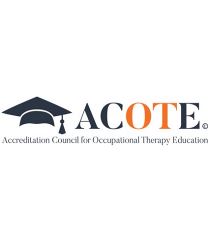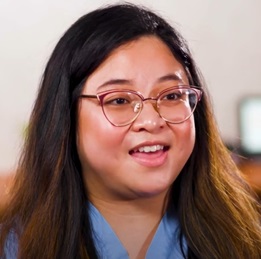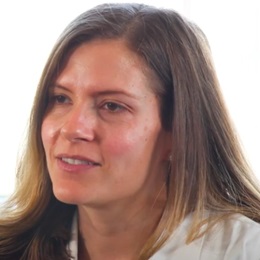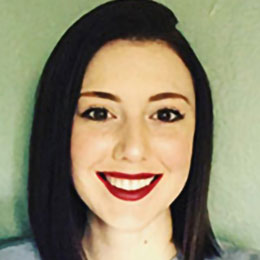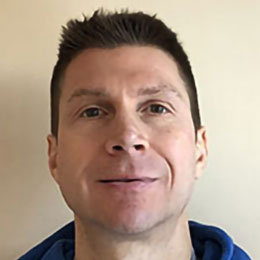Occupational Therapy Assistant
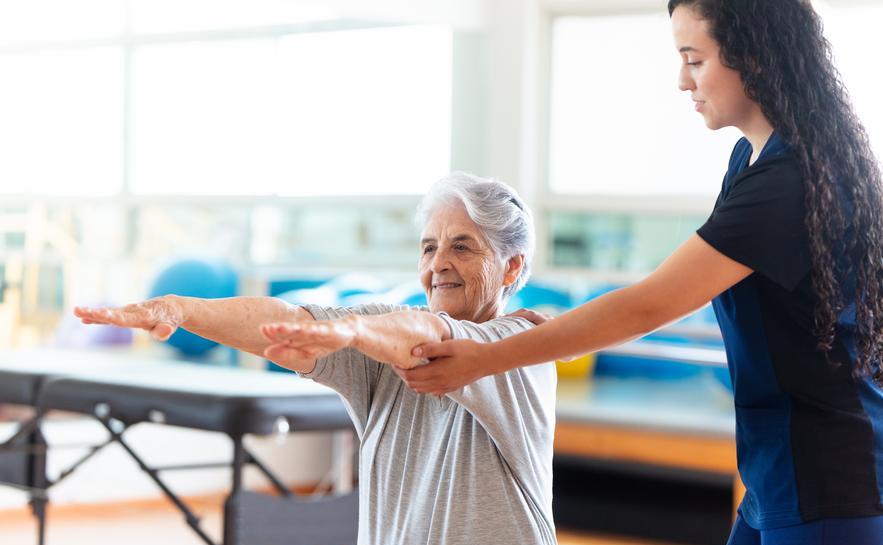
Request Information
Associate of Science in Occupational Therapy Assistant

Learn how to pursue becoming an Occupational Therapy Assistant (OTA) through South University’s Associate of Science in Occupational Therapy Assistant program. OTAs play a vital role on the patient recovery team, collaborating with individuals of all ages. Whether addressing challenges from illness, injury, or developmental and physical conditions, an OTA helps enhance patients' health, well-being, and their ability to engage in meaningful life activities. This support can range from self-care and family responsibilities to work, volunteering, and education.
At South University, Tampa, our Associate of Science in Occupational Therapy Assistant program offers practical career focused education both in the classroom and in real-world settings. With a hybrid of online and in-person instruction, our program is tailored to accommodate those facing scheduling challenges due to work, family obligations, or distance from campus.1
South University’s OTA program meets the requirements to sit for state licensure in Florida.2 South University cannot guarantee each graduate will pass the required licensure examinations. Outside agencies control the requirements for taking and passing certification/licensing exams and are subject to change without notice to South University. Students must pass the required licensure to work in their respective field.
NBCOT Certification Exam Program performance data on the NBCOT certification examination is available for public viewing by state and program level: https://www.nbcot.org/Educators-Folder/SchoolPerformance.
1Although hybrid offered courses are available in-person or online, this program still requires Clinical courses to be conducted in person and on-site. We cannot guarantee flexibility in these components of the program.
2Graduates are required to pass the national certification exam and obtain a state license in order to work in the field. (Exam names vary by program.) Please refer to the State Professional Licensure Determination and National Certification/Licensure section of the University catalog for additional information. South University cannot guarantee each graduate will pass the required licensure examinations. South University does not promise or guarantee licensure, employment or salary amounts.
Accreditation Council for Occupational Therapy Education
The Occupational Therapy Assistant program at South University, Tampa is accredited by the Accreditation Council for Occupational Therapy Education (ACOTE) of the American Occupational Therapy Association (AOTA), located at 7501 Wisconsin Avenue, Suite 510E, Bethesda, MD 20814. ACOTE’s telephone number c/o AOTA is (301) 652-6611. http://www.acoteonline.org. Graduates of the program will be eligible to sit for the national certification examination for the occupational therapy assistant administered by the National Board for Certification in Occupational Therapy (NBCOT). After successful completion of this exam, the individual will be a Certified Occupational Therapy Assistant (COTA). In addition, most states require licensure in order to practice; however, state licenses are usually based on the results of the NBCOT Certification Examination. Note that a felony conviction may affect a graduate’s ability to sit for the NBCOT certification examination or attain state licensure. More information on ACOTE may be obtained at https://www.acoteonline.org.
Admission Requirements
Procedure for Admission into the Professional Phase of the Associate of Science or Associate of Applied Science in Occupational Therapy Assistant Program
Admission into the Occupational Therapy Assistant (OTA) program is a two-step process:
- Candidates are eligible to enter the general education phase of the OTA program as “OTA students” by meeting South University’s General Undergraduate Admission Requirements.
- Candidates must complete prerequisite coursework and meet all requirements outlined below to be eligible for admission to the professional phase of the OTA program.
Students may transfer prerequisite courses into the program before entering the professional phase if approved by the registrar. The coursework that is transferred to South University must permit the student to obtain a 2.85 CGPA by the time the student applies for admission into the OTA professional phase. Students who transfer coursework into South University but cannot mathematically attain a CGPA of 2.85 by the time they would enter the professional phase will not be admitted to the OTA program.
Transfer credit will not be accepted for South University courses with an OTA prefix.
Note: This policy does not apply to South University OTA students (in good standing) transferring between campuses.
Admission Requirements for the Professional Phase of the Occupational Therapy Assistant Program
Applicants must apply for admission into the professional phase of the Occupational Therapy Assistant (OTA) program. Applicants must submit a complete application packet and meet all admission requirements as stated below to enter the ranking process. The professional phase slots will be filled by applicants with the greatest academic potential for success as determined by the ranking process. Applicants with the highest numerical ranking will be admitted to the professional phase of the program.
The criteria to determine admission to the OTA program include:
- Application must be submitted seven (7) weeks prior to the start of the professional phase of the program.
- Applicants must meet the Essential Functions of the OTA program.
- Applicants must have a minimum grade of 'C' or above in all prerequisites, except for the following course, in which students must achieve a minimum grade of 'B' or above: OTA1003 Introduction to Occupational Therapy Assistant. (OTA1001 Introduction to Occupational Therapy is an acceptable substitution.)
- Applicants must achieve a minimum CGPA of 2.85 or greater in prerequisite coursework. All prerequisite coursework must be successfully completed prior to entry into the Professional Phase of the OTA program.
- Applicants must have successfully completed the following courses in the past seven years from the intended start date of the Professional Phase of the OTA program: Medical Terminology, Anatomy and Physiology I (lecture and lab) and Anatomy and Physiology II (lecture and lab). Applicants must have successfully completed OTA1003 Introduction to Occupational Therapy Assistant in the past two years from the intended start of the Professional Phase of the OTA Program. (OTA1001 Introduction to Occupational Therapy Assistant is an acceptable substitution.)
- Applicants must have official transcripts on file at South University at the time of application to the Professional Phase of the OTA program. Applicants are responsible for requesting official transcripts from all postsecondary institutions attended and having them sent to South University. All associated fees are the responsibility of the applicant.
- Applicants must complete and submit an OTA Application when applying for acceptance in the Professional Phase of the OTA program; this includes a signed Acknowledgement of Risk and Release of Liability form and Health Insurance Statement form.
- Applicants must complete the OTA Video Observation Form and submit their responses with the OTA Application.
- Applicants must complete a background check at their own cost using the background screening and compliance tracking agency identified in the OTA Application. Applicants must meet timelines and requirements as detailed in the application packet. The OTA program follows the College of Health Professions Background Check Policy and Substance Abuse and Screening Policy located in the South University Catalog. Applicants are not eligible for admittance into any portion of the OTA program if they have a felony conviction, plea, or adjudication withheld, or any disqualifying misdemeanor, for which a pardon or exemption for disqualification has not been received, including but not limited to rape or sexual abuse or molestation, and abuse, endangerment, or neglect of a child, disabled person, or elderly person.
- Applicants must complete a drug screen at their own cost using the background screening and compliance tracking agency identified in the OTA Application. Applicants must meet timelines and requirements as detailed in the application packet. The OTA program follows the College of Health Professions Substance Abuse and Screening Policy located in the South University Catalog. Applicants with positive drug screen results will not be admitted into the OTA program. Applicants may be eligible to reapply to a future admissions cycle.
- Applicants must provide proof of required immunizations as identified in the OTA Application. Evidence that the Hepatitis B immunization series has been initiated or the signed waiver declining the Hepatitis B immunization must be provided at the time of application and completed according to CDC guidelines. All other immunizations must be completed no later than one week prior to the first clinical rotation. The student must upload all original lab results and evidence of immunization through the background screening and compliance tracking agency identified in the OTA Application. All associated fees are the responsibility of the applicant. Failure to submit clinical experience vaccination requirements in a timely fashion will deem a student ineligible for fieldwork placement.
- Applicants must show evidence of a physical exam by a physician, nurse practitioner, or physician assistant; results must be uploaded through the agency identified in the OTA Application. All associated fees are the responsibility of the applicant.
- Applicants must be in good standing with South University. All requirements for Financial Aid must have been met, as applicable.
- All OTA students are responsible for meeting matriculation deadlines and requirements as published within campus-specific Enrollment Guide.
Ranking of Applicants for Admission into the Professional OTA Curriculum will be based upon the following criteria:
- Cumulative GPA in required prerequisite coursework (2.85 or greater required).
- Science GPA (2.0 or greater required). Science coursework will not be accepted if greater than 7 years old.
NOTE: If a qualified student is not accepted or if a student is unable to matriculate into the Professional OTA Curriculum, they may use that same application to apply into the next cohort on that same campus within one year from the date of application submission. After that time, the student must apply as a new student.
Essential Functions for the OTA Program
The following are considered to be essential functions related to the profession of occupational therapy to be successful in the Occupational Therapy Assistant (OTA) program and in future employment as a Certified Occupational Therapy Assistant (COTA).
It is the responsibility of the OTA Program at South University to inform students considering a career as a COTA about the essential functions required both in the academic program and in the workforce. Factors and requirements will vary, depending on the specific area of practice and work setting.
Students must demonstrate safe and continuous application of these essential functions or of any and all others that are integral to the success of the OTA student and future occupational therapy practitioner. Students will display professional behaviors, assess their own performance with respect to the behaviors, and be ready to make behavioral changes as directed by academic and clinical faculty.
In addition, the OTA Progressions Committee may become involved in issues related to a student's performance of the essential functions. The OTA Progressions Committee may make recommendations to the OTA Program Director that result in, but are not limited to, a lower course grade, the creation of a remediation plan, exclusion from a course, dismissal from a Level I or Level II Fieldwork experience, professional behavior probation or dismissal from the OTA program and/or South University.
Both Section 504 of the Rehabilitation Act, 29 U.S.C.A. Section 794, and the Americans with Disabilities Act prohibit discrimination against "otherwise qualified" persons with a disability. South University provides accommodations to qualified students with disabilities. The Disability Services office assists qualified students with disabilities in acquiring reasonable and appropriate accommodations.
All students must demonstrate competency in the following essential functions related to the profession of occupational therapy:
Behavioral/Emotional Functions
Adaptation: The ability to respond with flexibility to change or difference.
Emotional Stability: The ability to control one's own emotions, differentiate between different emotions and identify each appropriately; use emotions to guide thinking and direct behavior.
Interpersonal Skills: The ability to interact effectively with others.
Safety: Maintain the well-being of others in compliance with policies and procedures.
Ethics: The ability to distinguish between right and wrong, to comply with authority and with policies and procedures.
Professional Behavior and Appearance: The ability to adjust behavior and appearance in response to given circumstances.
Cognitive Functions
Critical Thinking: The ability to define and resolve issues by asking questions, gathering and analyzing information.
Time Management: The ability to identify and prioritize tasks to be accomplished and maintain work pace appropriate to given work load.
Math, Reading Comprehension: The ability to apply basic math functions, calculate time and simple measurements; comprehend written words.
Perception: The ability to be aware of things in relation to others and to discriminate between those relationships.
Communication Functions
Verbal: The ability to speak using the English language, clearly communicating and clarifying information.
Written: The ability to communicate legibly and concisely in English, using proper grammar, punctuation, spelling, style and formatting.
Listening, Comprehending, Responding: The ability to hear, understand and respond appropriately to what was communicated.
Sensory Functions
Hearing: The auditory ability to detect sound within 10 feet away, sufficient to monitor clients and interact with others.
Touch: The ability to come into physical contact with something and perceive that it is there.
Vision: The ability to look at and see something or someone close-up and from a distance greater than 20 feet, noting verbal and nonverbal postures or behaviors.
Physical Functions
Fine motor dexterity: The ability to coordinate small muscle groups during movement, usually involving coordination between the hands, fingers and eyes to manipulate small objects.
Gross motor skills: The ability to coordinate large muscle groups to move and to stabilize the head, trunk, arms and legs to reach, lift, push, pull, stand, balance, walk, run, bend, kneel and crouch; possess minimum grip strength of 30 pounds in one or both hands, and the ability to stand up to 30 minutes at a time, push up to 250 pounds and lift/transfer up to 250 pounds.
Mobility: The ability to independently move easily from point A to point B.
Endurance: The ability to exert self and remain active for a long period of time (e.g., 45 minutes); stamina.
Environmental Functions
Working conditions: The ability to recognize, avoid and prevent safety and health hazards in the work setting.
For additional admissions information please see the admissions section here.
The Occupational Therapy Assistant program at South University, Richmond, Virginia Beach, and Tampa are accredited by the Accreditation Council for Occupational Therapy Education (ACOTE) of the American Occupational Therapy Association (AOTA), located at 7501 Wisconsin Avenue, Suite 510E, Bethesda, MD 20814. ACOTE's telephone number c/o AOTA is (301) 652-6211, and its web address is
http://www.acoteonline.org.
Graduates of the program will be eligible to sit for the national certification examination for the occupational therapy assistant administered by the National Board for Certification in Occupational Therapy (NBCOT). After successful completion of this exam, the individual will be a Certified Occupational Therapy Assistant (COTA). In addition, all states require licensure in order to practice; however, state licenses are usually based on the results of the NBCOT Certification Examination. Note that a felony conviction may affect a graduate's ability to sit for the NBCOT certification examination or attain state licensure. More information on ACOTE may be obtained at
http://www.acoteonline.org.
Student Handbook
Download the Occupational Therapy Assistant Student Handbook here.Certification
Requirements
If you are interested in pursuing a career as an occupational therapy assistant, you must have a high school diploma or equivalent and an associate’s degree from an accredited program offering the occupational therapy assistant curriculum. Individuals graduating from the Occupational Therapy Assistant program at South University will graduate with an Associate of Science degree.
Once all academic and fieldwork requirements are completed, students apply to take a national certification exam that is administered online by the National Board for Certification in Occupational Therapy (NBCOT). Program performance data on the NBCOT certification examination is available for public viewing by state and program level: https://www.nbcot.org/Educators-Folder/SchoolPerformance.
Upon successful completion of this exam, individuals may use the designation COTA following their name. NBCOT re-certifies occupational therapy practitioners every three years and has set continuing education requirements as part of that process.
South University’s OTA program meets the requirements for state licensure in Florida.
For questions regarding the professional licensure in this state, please see the Professional Licensure Determination section of the University catalog.
The Web site address for the National Board for Certification in Occupational Therapy (NBCOT) is http://www.nbcot.org/.
Tampa OTA Performance Data on NBCOT Certification Exam
Program performance data on the NBCOT certification examination is available for public viewing by state and program level: https://www.nbcot.org/Educators-Folder/SchoolPerformance.
Curriculum
Offered at Tampa.
(must be taken concurrently)
(must be taken concurrently)
Cost of Attendance
Cost of Attendance
To view the South University, Tampa OTA program cost of attendance, please click HERE.
Graduation Rates
Graduation Rate for OTA Program at South University, Tampa
The total number of graduates from the Occupational Therapy Assistant program at South University, Tampa during the three-year period of 2023-2025 was 27, with an overall graduation rate of 93%.
| Graduation Year | 2023 | 2024 | 2025 |
| Number of students who graduated on time (G1) | 10 | 7 | 8 |
| Number of students who graduated within 150% of expected time (G2) | 1 | 1 | 0 |
| Number of students admitted in original cohort (G3) | 13 | 10 | 10 |
| Number of students who withdrew due to reasons not related to academic or clinical performance (G4) | 1 | 1 | 2 |
| Graduation Rate | 92% | 89% | 100% |
Program results from the National Board for Certification in Occupational Therapy (NBCOT) can be found online at https://www.nbcot.org/Educators-Folder/SchoolPerformance.
NOTE: This information is posted in compliance with ACOTE Standard A.4.2. Accurate and current information regarding student and program outcomes must be readily available to the public on the program’s Web page. At a minimum, the following data must be reported for the previous 3 years: Total number of program graduates and graduation rates.
NOTE: ACOTE Graduation Rate Definitions: The number of students who graduate on time (G1) plus the number of students who graduate within 150% of expected time (G2) divided by the number of students admitted in the original cohort (G3) minus the number of students who withdrew due to military, health, family issues, death, and other reasons not related to academic and clinical performance (G4). Calculation per calendar year is + (G1 + G2)/(G3 - G4).
NOTE: Graduation Rates calculated according to the ACOTE Graduation Rate Definitions may differ from guidelines or requirements used to calculate the graduation rate in the Facts You Should Know [FYSK], or other publicly disclosed graduation/completion rates.
Program Mission and Goals
Upon completion of the program, students will be able to:
- Prepare occupational therapy assistants who appreciate and adapt to diverse and alternative cultures, settings, systems, processes, and ideas.
- Foster student skill in accessing relevant literature and information, using research-based evidence to make informed decisions in occupational therapy practice.
- Cultivate student skill in effective critical thinking, problem-solving, and clinical reasoning with clients across the lifespan in diverse practice settings.
- Foster development of student's communication skills to promote effective, appropriate interaction with all stakeholders.
- Instill in the student the values, attitudes and behaviors consistent with the occupational therapy profession's philosophy, standards and ethics.
- Provide the student with opportunities to acquire skills in advocacy for the profession of occupational therapy to other professionals, service providers, consumers, third-party payers, regulatory bodies, professional associations and the public.
- Provide the student with a challenging curriculum that prepares students to deliver occupational therapy assistant services with entry-level competency under the supervision of an occupational therapist in a variety of practice settings.
- Impart to the student a passion for lifelong professional development to meet changing societal needs.
- Provide ongoing opportunities for stakeholders in the OTA Program to have input into the development and evaluation of the OTA Program to ensure the Program remains true to its mission and philosophy.
Occupational Therapy Assistant at South University
When someone is in need, are you quick to lend a hand? Have you often been described as a good listener? As you choose your own career path, it is important to think about areas where you naturally excel in day-to-day life. those everyday talents - such as showing compassion, paying attention to detail, and even physical strength - will serve you well as an occupational therapy assistant. We invite you to find out more by contacting the Admissions Department at South University. Let us help point you in the right direction as you explore your future career path
About
Learn More About the Profession
Occupational therapy practitioners "treat the whole person" to help individuals perform meaningful and purposeful daily activities (occupations) that promote independence during leisure or at home, school, or work. Occupational therapy practitioners work closely with each individual to identify what is most important to him or her and enhance quality of life.
The registered occupational therapist (OTR) evaluates the client and develops a plan of care. The certified occupational therapy assistant (COTA) works under the supervision of the occupational therapist to implement the plan of care. The plan of care can be as simple as helping someone learn how to tie his or her shoes or as complex as helping someone regain movement, strength, and coordination on one side of the body.
Other examples of occupational therapy interventions include:
- Training children in balance and coordination activities so they can fully participate in school activities.
- Helping older adults recovering from a stroke to get dressed, bathe, and cook using only one hand.
- Helping injured workers regain range of motion and muscle strength to re-enter the workforce.
- Helping people with mental health impairments increase attention span and regain coping skills so they can fully participate in social situations.
The ultimate goal is to improve clients’ quality of life and their ability to perform daily activities as independently as possible.
Occupational therapy interventions also focus on adapting the environment, modifying the task, and teaching people skills. Occupational therapy services may include conducting comprehensive evaluations of the client’s home and other environments (e.g., work, school) or making recommendations for adaptive equipment and training in its use. Occupational therapy practitioners provide education and training to clients, family members, and caregivers. Occupational therapy practitioners are an integral part of the therapy team.
Occupational therapy practitioners use meaningful activities (occupations) to engage clients in activities of daily living (e.g., eating, bathing, dressing, hygiene). Occupational therapy practitioners are trained to modify the environment and train individuals to use assistive technology to attain functional independence. Occupational therapy practitioners also help clients regain range of motion, muscle strength, endurance, and coordination as they engage in activities that are meaningful to each client. The occupational therapy practitioner will educate and train a person with an upper limb amputation to use the prosthesis in activities of daily living.
The occupational therapy and physical therapy practitioner work closely together to help the client become as independent as possible in.
Mission
OTA at South University
OTA Faculty
South University Tampa
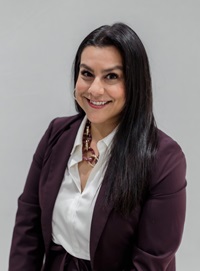
Assistant Dean, College of Health Professions Undergraduate Programs / OTA Chair / Assistant Professor
Dana Dixie
O.T.D., University of Toledo
B.S., University of Toledo
Dr. Dana Dixie has been a member of the South University, Tampa OTA Program since 2013. Earning a Doctorate in Occupational Therapy from the University of Toledo, Dr. Dixie’s professional background includes seventeen years of service as an Occupational Therapist. She specializes in aquatic therapy and dementia care.
An advocate for service learning and the Occupational Therapy profession, Dr. Dixie served as the Student Occupational Therapy Association faculty liaison for 8 years developing service and research initiatives and other impactful projects throughout Tampa. Several of these initiatives have led to state conference presentations and first place awards. Her outreach to her profession also includes mentoring OT doctoral capstone students.
Dr. Dixie serves as the Regional Representative Coordinator for the Florida Occupational Therapy Association. She also coaches a little league team for children with intellectual and physical challenges. In efforts to continue practicing occupational therapy, Dr. Dixie travels abroad on service projects for underserved populations.

Program Director
Tacorrie Jarrett
MBA, Saint Leo University
BA, Baruch College
AS, Keiser University
Mrs. Jarrett is a Florida Native, joined the South University, Tampa Team in Spring of 2024 as Program Director. Earning her Master of Business Administration with a concentration in Marketing from Saint Leo University, Mrs. Jarrett’s professional background includes 11 years of service as an Occupational Therapy Assistant primarily in skilled nursing and home health working with the geriatric population.
She has prior experience in Academia as an Academic Fieldwork Coordinator and Instructor. Has served previously as Secretary, for Florida Occupational Therapy Educational Consortium.
Mrs. Jarrett is a foodie that loves trying new restaurants and foods, as well as, reading, dancing and traveling.

Academic Fieldwork Coordinator
Amanda Smith
MSIS, South University
B.S., University of South Florida
A.S., South University
Mrs. Smith is a Tampa native and South University Alumni that joined the Occupational Therapy Assistant program in Tampa in the Spring of 2023 as Academic Fieldwork Coordinator and Instructor.
She graduated from the South University, OTA program in 2017 with an Associate's degree, and has a Bachelor's degree in Psychology with a minor in Criminology from the University of South Florida and a Master of Science in Information Systems from South University.
She has a background primarily in home health and skilled nursing facilities and has prior university teaching experience in the areas of adults and mental health. She is an active member of the American Occupational Therapy Association (AOTA) and the Florida Occupational Therapy Association (FOTA).
Her interests include fostering dogs, obstacle course 5K's, and landscaping.

Assistant Professor
Kristina Toussaint
B.S., Temple University
M.S., Thomas Jefferson University
Miss Toussaint joined the South University, Tampa OTA program in Fall of 2023 as fulltime faculty. Originally from Pennsylvania, she earned her Master of Science in Occupational Therapy from Thomas Jefferson University and her Bachelor of Science in Early Childhood/Elementary Education from Temple University, both in Philadelphia.
Miss Toussaint has served in a variety of settings, specializing in pediatrics and mental health. She is committed to excellence in her own clinical practice and strives to support others. She has presented at state conference and has served as conference co-chair, has developed and conducted multidisciplinary continuing education seminars, and provides free parent trainings and community outreach events to educate and support both clinical and non-clinical individuals. She is passionate about inclusion and neurodiversity affirming practice.
Miss Toussaint is a yoga instructor and owns her own small business. Her personal interests include running, dancing, nature, and her two dogs.
Helpful Links
Learn More About OTA
www.aota.org/Students.aspx - The American Occupational Therapy Association (AOTA). The Web site for the American Occupational Therapy Association offers information on the profession and answers questions often asked by persons applying to academic programs.
www.acoteonline.org - AOTA's Accreditation Council for Occupational Therapy Education (ACOTE®) is recognized as the accrediting agency for occupational therapy education by both the United States Department of Education (USDE) and the Council for Higher Education Accreditation (CHEA).
https://www.nbcot.org/Educators-Folder/SchoolPerformance - The Web address for NBCOT program data results.
bls.gov/ooh/healthcare/occupational-therapy-assistants-and-aides.htm - The Web site for the United States Department of Labor, Bureau of Labor Statistics, offers information on job duties and demands, anticipated job growth, and median pay for Occupational Therapy Assistants and Aides.
Career Outlook
When you have completed the program and graduated, you will be able to pursue a career* as an occupational therapy assistant.
*South University does not promise or guarantee licensure, employment, or salary amounts.
Graduates are required to pass the national certification exam and obtain a state license in order to work in the field. (Exam names vary by program.) Please refer to the State Professional Licensure Determination and National Certification/Licensure section of the University catalog for additional information. South University cannot guarantee each graduate will pass the required licensure examinations. South University does not promise or guarantee licensure, employment or salary amounts.
Grievances & Feedback
https://forms.office.com/pages/responsepage.aspx?id=uR6V4GXA3EiYUgvxHolBIwzQIfPIiNZBvtb8YWIdFPVUOElPOVJTNk1YRk9KR0o2Ujk5OUJKT1Q1Uy4u&route=shorturl
College of Health Professions Questions, Suggestions, or Feedback
https://forms.office.com/pages/responsepage.aspx?id=uR6V4GXA3EiYUgvxHolBIwp2OnsdJz9EhyUzBF4kBtBUQzFGV0RSVzNBM0lEVFhLSlQyVjZYWjZTVS4u&route=shorturl
Graduation Requirements
Associate of Science or Associate of Applied Science in Occupational Therapy Assistant Graduation Requirements
South University and the OTA Program reserve the right to make changes to any and all systems, policies and procedures related to the OTA Program at any time. This includes changes to admissions, financial aid, and the curriculum and graduation requirements. Please consult the most current South University Academic Catalog or most current addendum for updated information.
In order to graduate from the Associate of Science in Occupational Therapy Assistant program or the Associate of Applied Science in Occupational Therapy Assistant, a student must:
- Complete the course requirements described in the catalog in effect when the student enrolled. However, academic programs are subject to change at the discretion of the institution. Students who leave the University longer than one calendar year will be required to meet catalog requirements in effect at the time of their return. Students may request department chair/coordinator approval for a course substitution or waiver. The OTA Program Director in consultation with the Campus Director & Dean of Academic Affairs and Operations and College Dean must approve deviation from any program requirements. Students must complete Level II Fieldwork within 24 months following completion of the didactic portion of the program.
- Achieve a cumulative grade point average of 2.50 or higher in all courses in the student's major in the Professional OTA Curriculum.
- Achieve a cumulative grade point average of 2.50 or higher for all coursework taken at the University.
- Abide by all University rules and regulations before graduation.
Students are expected to complete all graduation and fieldwork requirements in a timely manner. Students are required to complete the didactic portion of the professional curriculum within 150% of the published length. Level II Fieldwork A, Fieldwork Seminar A, Level II Fieldwork B, and Fieldwork Seminar B must be completed within 24 months of the first day of the cohort’s originally scheduled Level II Fieldwork A placement.
What's New
Latest News and Blogs

Feb 24, 2026
The Growing Need for Mental Health Counselors
Learn why the need for mental health counselors is growing, how high the demand is, and the types of valuable services they provide to clients.

Feb 18, 2026
PTA Alumni Spotlight: Veteran Leads Home Health Agency
See how South University helped US military veteran Waddie Freeman grow his career in healthcare, from becoming a PTA to running a home health agency.

Feb 17, 2026
The Future of Home Care: Trends and Predictions
Learn what home care trends are driving growth in home health care, including an aging population, new technology, and evolving payment models.

Feb 10, 2026
Popular Degrees for Veterans
Learn what degrees are a common choice for veterans as they set out to achieve their goals and transition smoothly from military member to civilian.

Feb 10, 2026
Assistant Dean Helps Patient Receive Treatment
Karen M. Wilcox, the Assistant Dean of the graduate programs, used her expertise to help one of her patients detect and receive treatment for cancer.

Feb 04, 2026
MSN Alumni Spotlight: From CNA to FNP
Meet South University graduate Charlene Coates and learn how she went from being a certified nursing assistant to becoming a family nurse practitioner.
Fill out the form and a representative will contact you today to better understand your academic goals plus answer any questions you may have.
Campuses offer flexible learning formats* including: on-campus, virtual instructions, and online courses.
*Clinical, practicum, and externship requirements exist in certain programs and require field experiences. Learning formats may not be flexible.
Success! Your request was submitted. We'll be in touch soon!
In the meantime, you can view some of our FAQs.
If you want to talk to an admissions representative ASAP, please contact us at (888) 444-3404.
Outstanding Education for Remarkable Careers
We're committed to helping our graduates make an impact in their professional and personal lives. We applaud our alumni and the difference they make. Check out what some of our healthcare graduates have to say.

